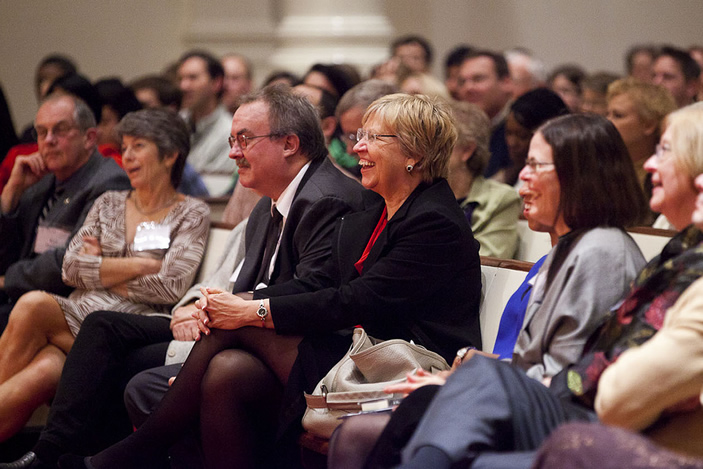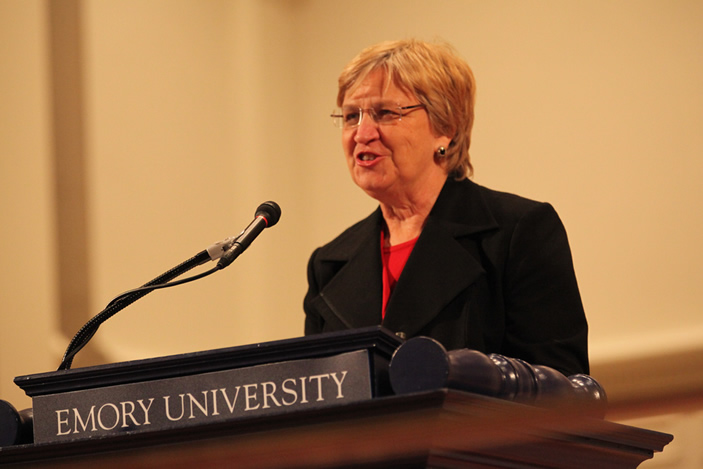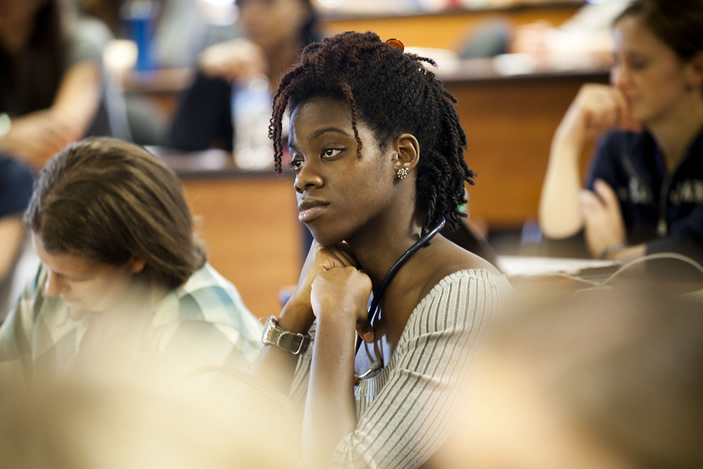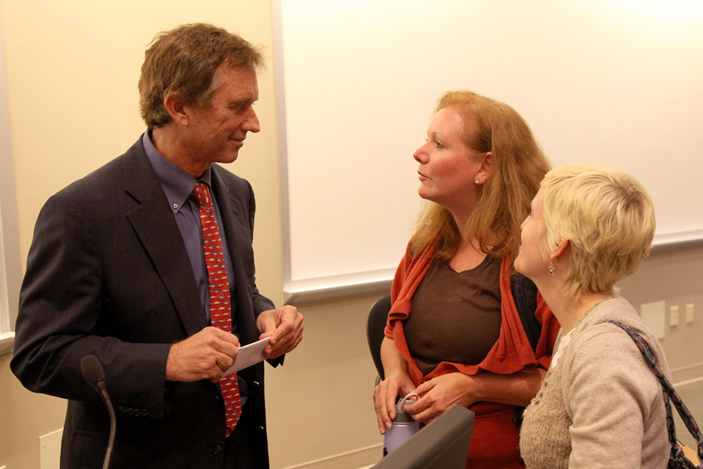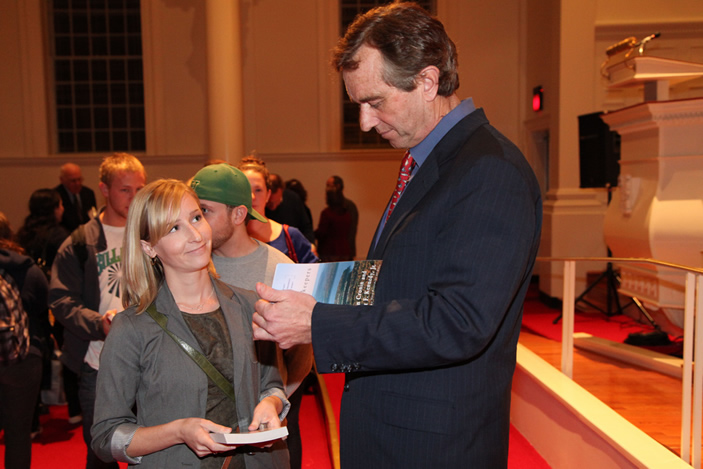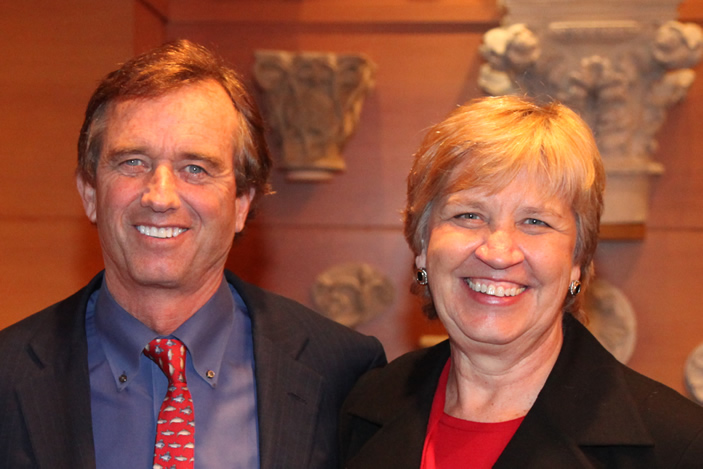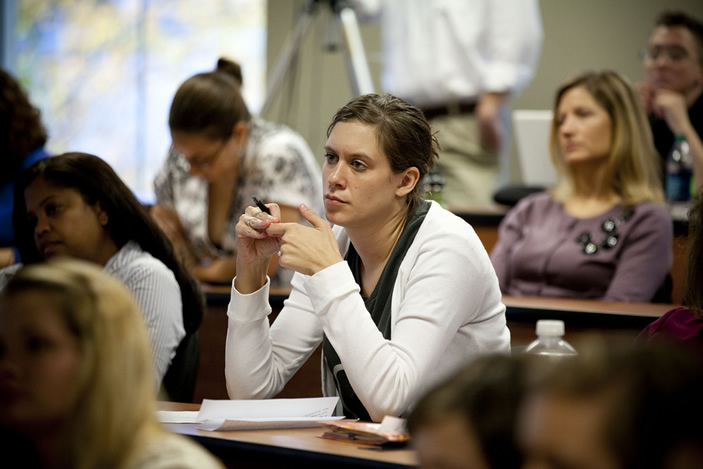Emory nursing students now know firsthand what makes environmental lawyer and author Robert F. Kennedy Jr. a force for change. He doesn't ever STOP.
His energy and drive were evident as he spoke to nursing students and faculty during the 10th anniversary celebration of the Lillian Carter Center for Global Health & Social Responsibility. The night before, he had stayed up all hours on a business call to the Middle East before catching an early morning flight from New York to Atlanta. "There was lots of yelling," Kennedy joked to explain his hoarseness.
A strained voice didn't deter him from describing his experiences as a social activist or his admiration for Lillian Carter, the center's namesake. He met the former nurse and Peace Corps volunteer in 1978, when he and his Harvard roommate showed up on her doorstep in Plains, Georgia. They hoped that she and her son, U.S. President Jimmy Carter, could stop the execution of his roommate's father, the deposed president of Pakistan. Sadly, their efforts proved unsuccessful.
"Lillian Carter was very kind to me personally," Kennedy told nursing students last fall. "I am happy to be in a place that bears her name."
It was October 15, 2001, when President Carter dedicated the center named for his late mother, who died in 1983 at age 85. While she and her husband Earl raised their young family near Plains, Miss Lillian worked as a registered nurse, caring equally for patients regardless of race in the days before integration. Upon joining the Peace Corps in 1966 at age 67, she was assigned to India, where she worked as a family planner and nurse in a clinic 30 miles from Mumbai. There she encountered leprosy and other forms of human suffering unlike any she had ever seen.
"Miss Lillian was known for her work as a public health nurse and advocate for social justice and health care," says Linda McCauley, dean of the School of Nursing. "The Lillian Carter Center has stayed true to her vision of caring for those in need."
The center's creation marked the realization of a dream shared by two former deans. Ada Fort planted the seed for a global nursing center by convincing health, business, faith, and community leaders to form the International Nursing Services Association (INSA) as an independent organization in 1972. Among INSA's first board members was Miss Lillian, who lent her insight as a Peace Corps volunteer. Today, INSA operates as Global Health Action, led by former Emory nursing instructor Robin Davis 76MN. When Marla Salmon became dean in 1999, she envisioned what became the Lillian Carter Center with a focus on nursing leadership, research, and social responsibility.
A decade later, nursing students and faculty follow in Miss Lillian's footsteps in a number of ways. They work with underserved populations in the Caribbean during winter break, assess the health of migrant farmworker families in South Georgia each June, and work with homeless populations and provide care to senior citizens in Atlanta throughout the year. Last summer, students partnered with Cabin Creek Health System in the coal-mining region of West Virginia. In Florida, the Dominican Republic, and Africa, faculty and student researchers seek to improve the health of women, new mothers, and babies. In Kenya and Zimbabwe, nursing leaders collaborate with Emory faculty to build and sustain the health workforce.
"I'm so impressed by the commitment of this school," said Kennedy during the 10th anniversary celebration.
In addition to his forum with nursing students, the Lillian Carter Center hosted a reception and public lecture given by Kennedy. It also sponsored the Second Annual International Scholars Day—featuring the work of students in Paraguay, the Dominican Republic, Bangladesh, and India—and the "Lillian," a new event honoring the nursing school's 50-plus community partners. All play a vital role in service-learning, which is integral to the nursing school's undergraduate and graduate curriculum.


